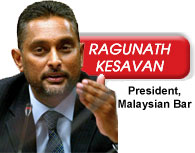By Clara Chooi - The Malaysian Insider
IPOH, Oct 22 — The agent provocateur whose work resulted in the arrests of two former PKR state executive councillors for corruption, refused today to disclose in court how much the Malaysian Anti-Corruption Commission (MACC) had paid him for his services.
Mohamad Imran Abdullah, 34, who is the star witness in the trial, caused a stir when he refused to give the information despite being told to do so by the Sessions Court Judge Azhaniz Teh Azman Teh.
The question was posed during cross-examination by defence counsel Abdul Roni Rahman, who is representing the two former PKR men, Behrang assemblyman Jamaluddin Mohd Radzi, 52, and Changkat Jering assemblyman Mohd Osman Mohd Jailu, 57.
Roni: Were you paid some compensation for your work?
Mohamad Imran: As 'sagu hati' (a gift), yes.
Roni: Can you tell us how much the MACC (formerly Anti-Corruption Agency) paid you?
At this juncture, Mohamad Imran hesitated and MACC prosecution unit head Datuk Abdul Razak Musa stood up to interject.
“I object to this question. It is irrelevant,” said Abdul Razak.
Judge Azhaniz Teh frowned before asking, “Why is it irrelevant?”
The judge then ordered Mohamad Imran to answer the question.
The nervous-looking witness however refused to do so and after a pause, told the court, “I am sorry, tuan, but I do not want to answer this question.”
Judge Azhaniz Teh looked at Abdul Razak and asked, “This is your witness and he has refused to answer the question although the court has ordered him to. Why the secrecy? Is it against any government policy?”
Abdul Razak said that if the witness were to answer the question, the court should be cleared. He added that answering such a question was against public policy.
Defense counsel Surjan Singh, who is representing another accused in the trial, then stood up and loudly disagreed with Abdul Razak.
“This is not against any public policy. We all know that all informers are paid. He already admitted that he was paid so what is wrong with telling the court how much?” said Surjan Singh.
Judge Azhaniz Teh then told both the prosecution and the defence to submit on the matter after lunch.
When the case resumed, Abdul Razak said that payments made to agent provocateurs was a “government secret matter” which was why he did not want the information to be made public.
He cited sections in the Evidence Act 1950 to back his earlier statement that the information was not relevant to the trial.
When the defence stood up to disagree, Judge Azhaniz Teh asked, “What is the purpose of asking that question? How is it relevant to the trial?”.
Surjan Singh stressed that the information was vital as the amount received by Mohamad Imran for his work as an agent provocateur would indicate the latter's mental state when carrying out his duties.
“It would show his frame of mind to do the job successfully in ensuring an arrest and a conviction.
“He himself admitted he is an agent provocateur. Also, he admitted he was paid.
“If he was paid peanuts, he would not have gone to the extent that he had gone, in order to obtain the arrests,” said Surjan Singh.
He added that given the short opportunity for research on the matter, he had been unable to find any authority to state that Mohamad Imran should not be compelled to answer the question.
“If I am given more time, I can submit further on this matter,” he said.
Judge Azhaniz Teh granted Surjan Singh his request and fixed Monday, October 26, to hear the submissions.
During the trial earlier, Roni attempted to wrangle an admission from Mohamad Imran that both Jamaluddin and Mohd Osman had been victims of entrapment.
After they were slapped with corruption charges, the two former PKR men defected from their party in February this year and became Barisan Nasional-friendly Independents, a move which led to the fall of the Pakatan Rakyat government in Perak.
Roni also pointed out more discrepancies in Mohamad Imran's reports to the MACC, this time over the handing over of cash to Mohd Osman.
On August 16, 2008, when Mohamad Imran met with Mohd Osman at the Aquarius Coffee House of the Summit Hotel in Bukit Mertajam, the former inaccurately stated in his report that RM5,000 had been handed over to Mohd Osman although the latter never touched the cash.
Roni: In Aquarius, you put the money on the table.
Mohamad Imran: No. I had the money in my hands and intended to give it to Mohd Osman. And then Mohd Osman told me to give it to (PKR politician) Usaili Alias. (Usaili is another accused in the trial).
Roni: Do you agree that Mohd Osman did not want to accept the money and that was why he asked to give it to Usaili, who was the elections director for the Permatang Pauh by-election?
Mohamad Imran: I disagree.
Roni: I am not confusing the facts here. Let me ask you a direct question – You gave the money to Usaili because the money was intended to go to aid PKR in the by-election?
Mohamad Imran: I disagree.
The RM5,000 was allegedly meant to help Mohamad Imran in securing a multi-million ringgit housing project development in Seri Iskandar, a township some 45km from here.
Roni then asked Mohamad Imran if everything that he had done between Aug 4 and Aug 19, 2008, had been under the orders of MACC officer Firdaus Mohd Idris.
Mohamad Imran said yes and added that another MACC officer, by the name of “Azam”, had also been coaching him.
Roni: This means that it was not your personal intention to embark on this so-called housing project in Seri Iskandar?
Mohamad Imran: I agree.
Roni: Do you agree, that from then until even now, such a project does not even exist and there was never any intention on the part of anyone to embark on such a project?
Mohamad Imran: I disagree.
Roni: Do you agree that during the handing over of RM1,000, RM1,400, RM2,000, RM5,000, RM5,000 and RM9,000 (on separate occasions before Aug 19), there was no arrests made by the MACC?
Mohamad Imran: I agree.
Roni: There was no arrest during this time because the funds were actually meant to help PKR in the Permatang Pauh by-election.
Mohamad Imran: I disagree.
Roni: The MACC did not make arrests because on these occasions, the two former state executive councillors (Jamaluddin and Mohd Osman) were not present (during the handing over of the money) at the time.
Mohamad Imran: I do not know.
Roni: This is because MACC's main target was to arrest the two of them.
At this juncture, Abdul Razak stood up to object.
“How would he (Mohamad Imran) be able to answer this question? He is not from MACC,” he said.
Roni then changed his line of questioning but Mohamad Imran, who was beginning to look frazzled, stumbled through most of the next few queries, triggering laughter in the courtroom.
Roni: Do you agree that giving a bribe is a criminal act?
Mohamad Imran: (nods) I agree.
Roni: Do you agree that offering sex (bribes) is also wrong?
Mohamad Imran: (pause) I am not sure.
The audience in the gallery sniggered.
Roni: Since you agree that giving a bribe is wrong, so then you are agreeing that you were wrong to offer bribes to the accused.
Mohamad Imran: I disagree.
More laughter from the courtroom was heard.
Roni: Do you agree that a person who did not receive a bribe, did not commit a crime?
Mohamad Imran: (pause) I disagree.
At this point, the two former PKR men were seen grinning.
Roni: Since there was actually no real intention to embark on the housing project in Seri Iskandar, do you agree that you cheated Usaili, Ruslan, Zul Hassan and Fairul by saying you wanted to develop such a project?
(Former Perak Tengah district councillor Zul Hassan, 45, and businessman Fairul Azrim Ismail, 31, are also jointly charged for various counts of corruption in the same trial.
Former Perak Development Corporation technician Ruslan Sahat was also charged but his charges were dropped when he passed away on Aug 3.)
Mohamad Imran: I disagree.
Roni: If you do not tell the truth to someone, does it make you a liar?
Mohamad Imran: (Long pause and silence).
Roni: It is a simple question. If you say something that is not true, you are a liar. Agree?
Mohamad Imran: I disagree.
The trial continues tomorrow with the cross-examination of Mohamad Imran by Fairul's lawyer, Mohd Asri Othman.
 KUALA LUMPUR, Oct 22 — The announcement of MCA’s peace plan today left niggling doubts over how solid the reconciliation between former rivals will be and whether it will really be the end to months of power struggle.
KUALA LUMPUR, Oct 22 — The announcement of MCA’s peace plan today left niggling doubts over how solid the reconciliation between former rivals will be and whether it will really be the end to months of power struggle. Vice president Datuk Ng Yen Yen shuffled uncomfortably in her seat even after Liow arrived.
Vice president Datuk Ng Yen Yen shuffled uncomfortably in her seat even after Liow arrived.





 The recent testimony of Thai pathologist Dr Pornthip Rojanasunand in the inquest into Teoh Beng Hock’s death once again raises serious issues that must be addressed.
The recent testimony of Thai pathologist Dr Pornthip Rojanasunand in the inquest into Teoh Beng Hock’s death once again raises serious issues that must be addressed.

 KUALA LUMPUR, Oct 22 — An end may be in sight in the MCA crisis with the recent intervention of Prime Minister Datuk Seri Najib Razak.
KUALA LUMPUR, Oct 22 — An end may be in sight in the MCA crisis with the recent intervention of Prime Minister Datuk Seri Najib Razak. KUALA LUMPUR, Oct 22 — Batu MP Tian Chua was today found guilty by the magistrate's court of biting a police constable and preventing the officer from discharging his duty in December 2007.
KUALA LUMPUR, Oct 22 — Batu MP Tian Chua was today found guilty by the magistrate's court of biting a police constable and preventing the officer from discharging his duty in December 2007.



